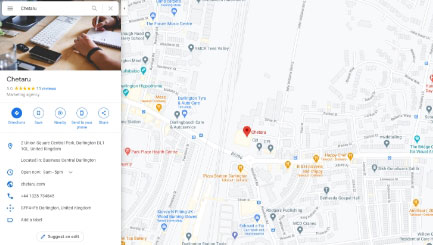Why Google My Business is So Important to Local SEO
30 Dec 2024 | 7 min read
With all the talk about how doing business online opens up new international markets, it’s easy to forget how much easier the internet makes it for local customers to find products and services in their area.
Using Google My Business, for instance, will give your company the ability to list your location on Google Maps and significantly boost local search results, thereby massively boosting the chances of nearby customers buying from you.
Read on to learn more about Google My Business and why it’s so important to local SEO.
What is Google My Business?
Google My Business is a Google tool that gives business owners more control over the way that their company appears in Google search results.
It’s free and easy to use – and a tool that every business owner should be using if they want to boost their local SEO!
Increasing the Visibility of Your Business
Using Google My Business allows businesses to manage their presence across a range of Google services, such as Maps, Search and Reviews.
It’s therefore a great (some might even say ‘essential’) way to give your company, products and services vital extra visibility and maximise the benefits of added discoverability.

Upping Interaction With Your Customers
Google My Business will also allow you to interact with your existing and potential customers much more easily.
You will be able to respond to reviews, questions and update opening times or contact details that might otherwise have gone out of date and thereby led to customer frustration.
This facility enables you to become far more responsive to changes and therefore more accessible to your target audiences.
Brick-and-Mortar Businesses Only for Now
As things stand, Google My Business is only accessible to brick-and-mortar businesses, such as bars, pubs, physical shops, restaurants and so forth that interact with clients and customers in person.
As such, online-only businesses (in other words, businesses with no physical presence whatsoever) are not yet eligible for Google My Business listings.
And, of course, physical businesses like the above are the ones that have suffered the most during the coronavirus pandemic, so it’s doubly (triply!) important that they make themselves as visible to local customers as possible post-lockdown.
How Does Google My Business Work?
To get started with Google My Business, you’ll need to verify your business through Google themselves.
The likelihood is that your business already appears on Google, even if the results are fairly limited, so you’ll need to sign up and claim the business listing in order to begin managing the way that the listing appears to Google users.

If your business doesn’t appear on Google, then the first thing to do is add your business to Google.
There’s a chance that the location of your business may be registered to a business that has since closed down. If this is the case, you’ll need to suggest an edit in order to have the business marked as ‘permanently closed’ before you can claim the location as the address for your own business.
You’ll also need a Google account registered to your business email, as this will be where all interactions, changes and reviews will be forwarded to once your Google My Business listing is set and ready to go.
You will then need to confirm the actual physical address of your business and may need to adjust the marker on your business’ Google Maps location in order to maximise accuracy.
Google will also ask you to answer some questions about your business’s general info – business category, phone number, website and so forth – before verifying that you are who you say you are.
Optimise Your Google My Business Listing
To make the most out of your Google My Business listing, you’ll need to make sure that you’re optimising your listing to its full potential.
This means filling out as much info as possible, as well as being strategic with key SEO terms and phrases that will play a big role in your business appearing high up for results relevant to searches made by potential customers.
When entering your business details, be sure that you don’t leave your would-be customers guessing. Where is your business exactly? What services do you offer? How can customers get in touch?
Below are some examples of details that are particularly important for you to include in your Google My Business listing and which will help you boost your local SEO.
Be Clear on Opening Times
Opening hours are incredibly important details to share on your Google My Business listing.
Say that you’re a small accountancy firm based in Wetherby, Bishop Auckland, Exeter or wherever.
An accountancy firm of your nature will probably be representing other small local businesses rather than massive international corporations, so it’s unlikely that you’ll have – or need – a 24-hour phone answering service.
And your existing and potential clients will probably have questions or challenges that they would be more comfortable asking you about via phone than email – so they’ll need to know your exact hours of business to get a better idea of when to ring you.
And what if you own a nail salon in Darlington or another location in the UK (or anywhere in the world, for that matter!).
If your business operates at different hours depending on the day, season or public holidays, then make sure that all these different hours are filled out.
You’ll lose potential customers quickly if they can’t get all the answers they need before using your services. Even worse, they’ll probably go to a competing business that offers more certainty instead!
A Picture Can Speak a Thousand Words
If you can add photos, do it! On average, businesses whose listings include photos receive 42% more requests for directions through the Google Maps service than those that don’t.
You could therefore be missing out on huge sales potential if you neglect to include enticing visuals in your Google My Business listing.

If you’re a restaurant, cafe, bar or pub, give your potential customers the help they need to decide whether it’s the place for them by showing them pictures of your food, the drinks on offer (a well-pulled pint of bitter or barista-style coffee, for instance), welcoming staff and interiors.
By way of an example, put yourself in the shoes of a family that wants to find a local pub in the North East where they can enjoy a delicious traditional Sunday lunch in cosy surroundings.
Are they going to pick a place they find on Google that has no pictures on its listing?
Or one that shows them – even without having to click on the website link – images of great big Yorkshire puddings filled with luscious gravy, meat (or veggie alternative!) cooked just how they like it, generous portions of roast potatoes and fresh veg?
We think you can probably answer that one for yourselves…
“Just look at that irresistible-looking sticky toffee pudding! And, ooh, is that a log fire?!”
Google My Business for Local SEO
Search Engine Optimisation (SEO) is crucial when it comes to boosting your Google results ranking – and that includes your local search ranking, too.
The best way to go about boosting your local SEO is to include relevant search terms within your listing.
The most effective way to choose these terms is to think about them strategically. Basically, think about the Google (or other search engine) searches you’d most like your restaurant to appear in.
For example, an Italian restaurant in Yarm will want to include keywords and phrases like ‘Italian restaurant in Yarm’ or ‘Yarm best place Italian food’ or ‘authentic Italian Yarm’ within the listing, as these are likely to be the searches that people (or people visiting the area) will be entering into Google when trying to find a great place to eat Italian food in Yarm or nearby.
How to Improve Ranking in Local Search
One of the most effective ways to boost your local ranking is to take maximum advantage of the ‘local posts’ feature offered by Google My Business, which allows you to create posts visible to your local audience.
This includes posting about special offers, events, seasonal messages, answering FAQs and so forth – with the added benefit that making use of these posting opportunities helps keep your listing fresh and up-to-date.
After all, a business that regularly posts using this functionality looks a lot more consistent and relevant to the search engine algorithm, and will – as such – be rewarded with a higher search ranking for terms that your customers will be using.
Regularly posting will also make your business look more attractive to potential customers because it show that:
- You’re still operating (sadly not true of so many businesses that have fallen foul of lockdown and social distancing measures)
and
- You really care about the customer and their needs
Again, this is another area where SEO comes in incredibly useful.
It must be clear from your listing where exactly in your local area you are and what services your potential clients and customers can expect to receive from your business.
Ensure that you include these details in your listing, using keywords and phrases to boost your search ranking and online visibility.
Giving Your Business the Local SEO Boost It Needs
At Chetaru, we provide digital marketing services that help businesses grow their online presence and outperform their local or international competition.
SEO plays a big part in the success we generate for our clients. So, if your business needs help attracting local or international customers, we’re here to help you with our Google My Business Listing and professional SEO services.
If you want to boost the visibility of your business, products or services locally or internationally, please drop us an email at info@chetaru.com.
